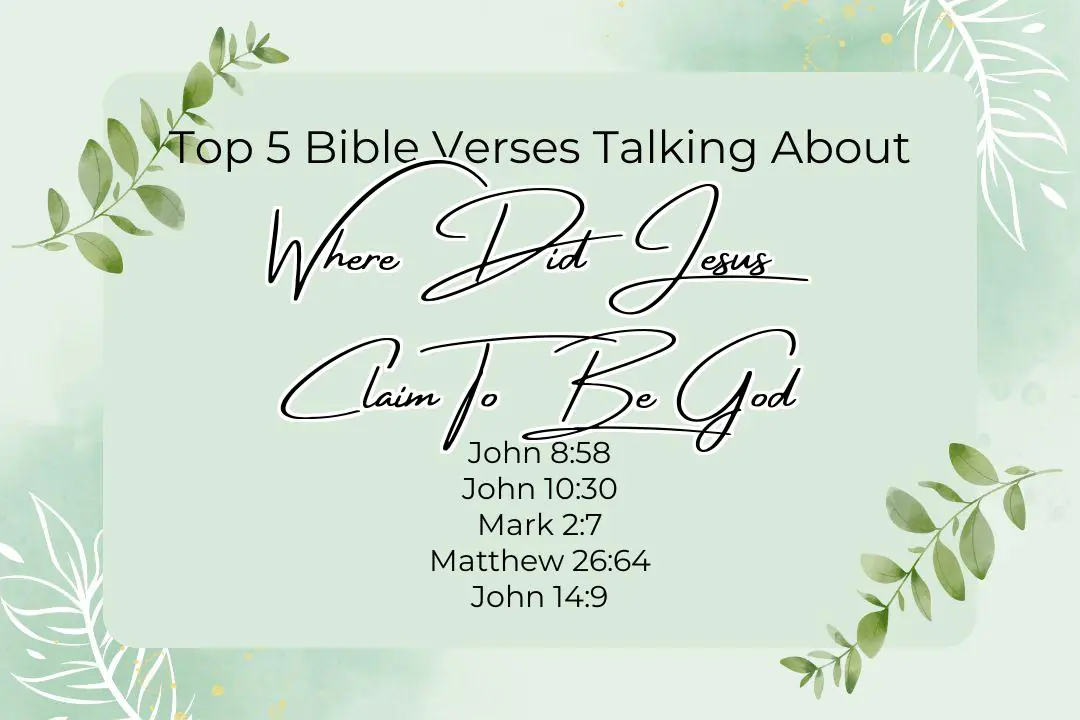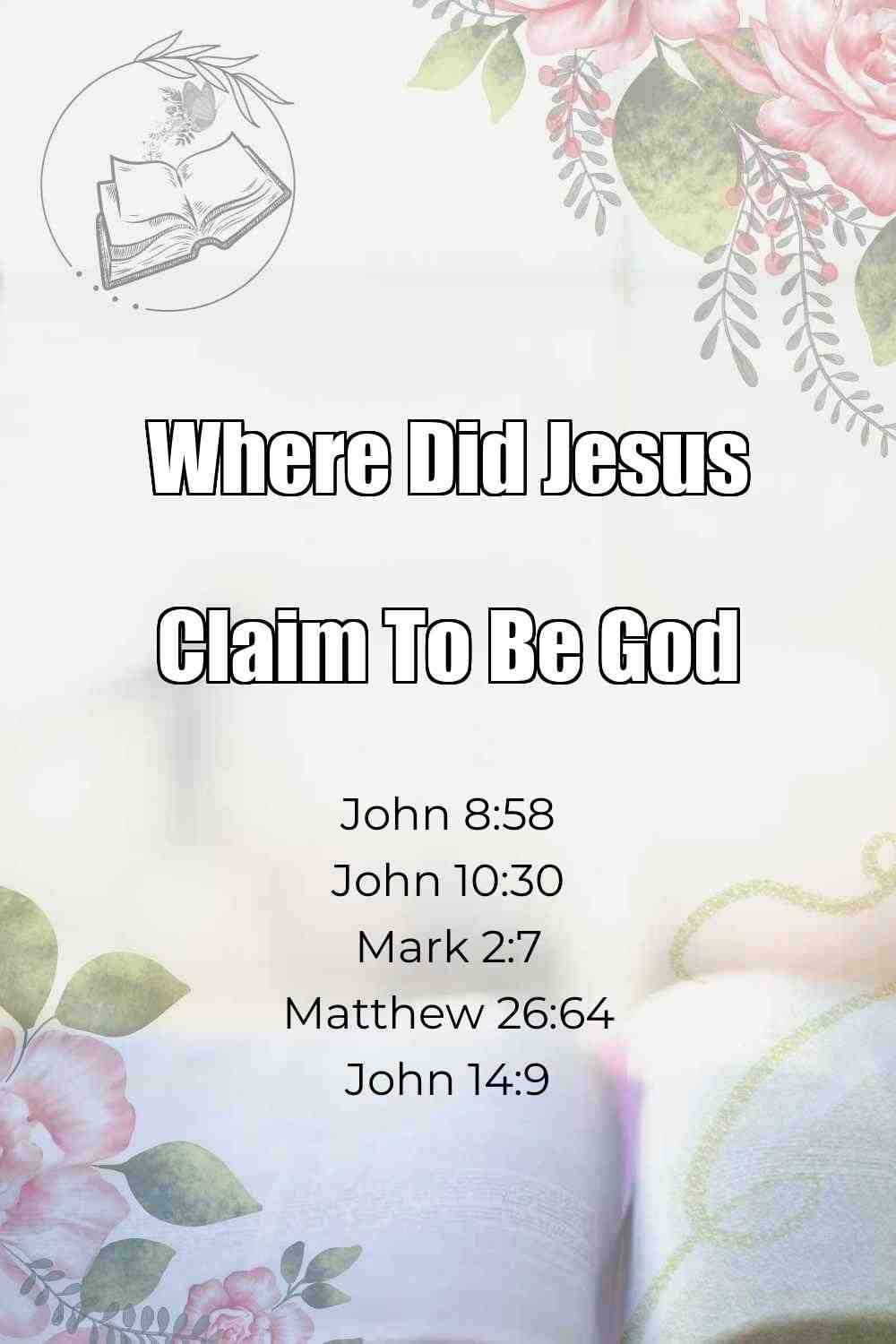I’ve lost count of how many times I’ve heard people ask, did Jesus actually say he was God? To be honest, the answer kinda threw me off guard. I mean, take those “I am” statements in John’s Gospel – like, what’s that all about? Sometimes I wonder if Jesus was just messing with the people back then, claiming he was in charge of nature and all that supernatural stuff. Guess that’s what makes his claims so darn interesting – where did he draw the line, and how does it all affect us now?
Top 5 Bible Verses About Where Did Jesus Claim To Be God
I’ve stumbled upon these verses that, honestly, have been a huge eye-opener for me. Taking a gander at ’em, you might just find yourself seeing things in a whole different light – I know I did. They offer up some extra info that’s pretty useful, imo.

Picture by BibleBreathe.com about Where Did Jesus Claim To Be God
My Take on Jesus’ Claims to Divinity in the Gospel of John
Breaking Down Those “I Am” Statements
To be honest, I’ve spent a fair amount of time trying to wrap my head around what Jesus is actually saying in the Gospel of John – it’s like, on the surface, his words seem pretty simple, but the more I dig, the more I realize just how big of a deal they are.
So, Jesus makes these “I am” statements throughout the book – they’re not just some offhand comments; they’re a big part of what he’s trying to communicate about himself. For example, when he says, “I am the Bread of Life” (John 6:35-59), he’s not just telling us that he’s, you know, some special kind of spiritual food – he’s actually claiming to be, like, the source of life itself, if that makes sense.
The Bible puts it like this:
“And Jesus said unto them, I am the bread of life: he that cometh to me shall never hunger; and he that believeth on me shall never thirst” (John 6:35, KJV).
I mean, by saying this, Jesus is basically drawing a straight line between himself and God – you know, the one who took care of the Israelites in the wilderness and gave ’em that manna to eat.
When he says he’s the “Light of the World” (John 8:12-20), I don’t think he’s just like, “I’m a good guy, follow my lead!” – I think he’s actually claiming to be God’s presence in the world – the real deal.
And then there’s that claim about being the “Good Shepherd” (John 10:1-18) – that’s not just some hippie talking about how much he loves sheep, man. He’s actually saying he’s the one who takes care of us, watches over us, and guides us – all the stuff that God does, right?
But when he says, “I am the Resurrection and the Life” (John 11:25) – that’s some wild stuff, if you ask me. That’s not just him saying we’ll all live forever, or whatever – it’s like, he’s telling us that he’s the actual source of life itself, the one who can bring dead people back to life. I mean, what even is that?
And we can’t forget his famous line, “I am the Way, the Truth, and the Life” (John 14:6) – that’s not just him giving us, like, directions on how to get to heaven – it’s him telling us that if we want to really know God, he’s the only way to go.
C.S. Lewis put it pretty bluntly: “Either this man was, and is, the Son of God, or else a madman or something worse.” When it comes down to it, we’re all gonna have to make a choice – we either believe what Jesus is saying about himself, or we gotta dismiss him as some kind of crazy person or a total liar. And, I mean, the outcome of that choice… it’s pretty huge, man.
Figuring Out Jesus’ Claims to Being God in the Synoptic Gospels
Often, people ask me stuff like, where did Jesus actually claim to be God. It is one of them questions that’s had folks arguing for ages. As I look through the Synoptic Gospels, I see that Jesus didn’t always just come right out and say, hey I’m God. Instead, it was more of a vibe, you know, implicit in his words and actions.
‘Son of God’ – What’s in a Name
This whole ‘Son of God’ thing is pretty deeply tied to the idea of Jesus’ divinity. I mean, if you read Matthew’s Gospel, there’s this bit where it says
“And lo a voice from heaven, saying, This is my beloved Son, in whom I am well pleased” (Matthew 3:17, KJV).
To me, that’s God basically setting the scene for Jesus’ ministry and highlighting how he’s different, special even. Same sorta thing in Mark and Luke, they both say he’s the Son of God (Mark 1:11, Luke 3:22). It’s not just some cute term, its meaning runs way deeper.
Jesus Being Able to Forgive Sins
One pretty major way Jesus showed his divinity was by forgiving sins. Like, in Matthew, there’s this one part where he heals a guy who can’t walk and then just tells him,
“Thy sins be forgiven thee” (Matthew 9:2, KJV).
The scribes and Pharisees freaked out about this, ’cause normally, you’d think only God could do something like that. But then Jesus shows them what’s up, saying
“But that ye may know that the Son of man hath power on earth to forgive sins, (then saith he to the sick of the palsy,) Arise, take up thy bed, and go unto thine house” (Matthew 9:6, KJV).
To me, that’s Jesus making it pretty clear, he’s the one in charge here, he’s got the power.
Being in Charge of the Sabbath
Lastly, the way Jesus is with the Sabbath is another pretty cool example of how he’s kinda, you know, saying he’s God. There’s this bit in Matthew where him and his followers are out picking grain and it just so happens to be on the Sabbath (Matthew 12:1-14). People get upset and Jesus is all, well, what about David and those priest guys, didn’t they do things on the Sabbath too, I’m kinda like that, I’m in charge here (Matthew 12:8). That to me is him saying, in a way, he’s divine, but not exactly screaming it from the rooftops.
Me, I’m still figuring this all out, but one thing’s for sure, when Jesus says and does stuff, its not just on the surface, its deeper, he’s saying and showing that he’s more than a prophet, more than a teacher, he’s actually the Son of God.
Jesus’ Claims to Divinity through His Actions

Photo modified by BibleBreathe.com. Original photo by Sonika Agarwal on Unsplash
He Did What Only God Can Do
I got fascinated by how Jesus goes about saying He’s God – without, you know, saying it. I mean one of the really convincing ways He shows it’s true is through the stuff He does.
Jesus’ Miracles: More Than Just Tricks
So think on it for a sec, like when He turns water into wine at that wedding in Cana – it’s in John 2:1-11, if you wanna check – He wasn’t just trying to wow the guests. There’s more to it, it was about making a statement.
The Bible says,
“This beginning of miracles did Jesus in Cana of Galilee, and manifested forth his glory; and his disciples believed on him.” (John 2:11, KJV).
See, those miracles He did aren’t just fun and games, they showed who He really is and that got people to believe in Him.
Jesus: The Master of Nature
Now Jesus didn’t just do miracles though – that wasn’t the half of it. He controlled all of nature too. That time Jesus stops the storm on the lake comes to mind…you can read about it in Matthew 8:23-27, Mark 4:35-41 and Luke 8:22-25.
The Bible says,
“And he arose, and rebuked the wind and the raging of the water: and they ceased, and there was a calm.” (Luke 8:24, KJV).
He just didn’t calm the storm; He was flat out ordering it to be done. To do that you gotta be God – only He gets to boss the sea around like that.
Jesus: The Conqueror of Demons
Oh, yeah and the times He just goes around kicking out demons like they’re nothing too. You can read it in Matthew 8:28-34, Mark 5:1-20, and Luke 8:26-39.
The Bible says,
“And Jesus asked him, saying, What is thy name? And he said, Legion: because many devils were entered into him.” (Luke 8:30, KJV).
It’s like those demons, super strong as they are, just do what Jesus tells them. He wasn’t no regular exorcist guy that’s for sure. When you see Him boss demons around it’s like seeing His divine badge shine through His chest or something – God in human skin.
As for me what can I say…C.S Lewis had a point – it comes down to that one huge point that changes everything: who do you say He is, at the end of it all, the son of God or someone in desperate need of therapy or much much worse?
So at this point it seems what I think couldn’t get more obvious. This stuff speaks super loudly about who He really is and with or without Him even directly saying it out: Jesus called himself God every single time his actions declared it even without saying it…He acts out who He is, loud and clear.
Jesus’ Claims to Divinity through His Titles
‘The Son of Man’
To be honest, I’ve always been kinda perplexed by Jesus calling Himself ‘The Son of Man’. I mean, at first glance, it seems pretty humility-driven – almost like He’s intentionally downplaying the whole divinity thing.
But then I dug deeper, started researching, and it turns out this title is actually a nod to a way more profound meaning in the book of Daniel – specifically where the prophet writes about a figure given some serious authority and power by God.
“I saw in the night visions, and, behold, one like the Son of man came with the clouds of heaven, and came to the Ancient of days, and they brought him near before him.” (Daniel 7:13, KJV).
See, in this light, ‘The Son of Man’ title is more affirmation than denial – Jesus assertion of His divine right, basically. He’s owning the all-powerful role granted by God.
‘The Messiah’
There’s this super pivotal moment where Jesus asks the disciples about His identity, you know: “Who do you say I am?” That’s when Peter drops that famous line – “You’re the Christ, the Son of the living God” (‘course, this is scripture now!).
“And Simon Peter answered and said, Thou art the Christ, the Son of the living God.” (Matthew 16:16, KJV).
What I realized is, ‘The Messiah’ – or ‘The Christ’ – is more than a fancy title; it stands for “the anointed one”. Like, that one person destined by God to rescue His people.
Jesus using this title sends a strong message that He indeed is that chosen savior come to set humanity free from sin’s grasp.
‘The King of Kings’
Moving right along to this utterly majesterial title, ‘The King of Kings’ – that to me speaks volumes of Jesus dominance over just about, well… everything.
“These shall make war with the Lamb, and the Lamb shall overcome them: for he is Lord of lords, and King of kings: and they that are with him are called, and chosen, and faithful.” (Revelation 17:14, KJV).
I understand now, it’s way more than stating the obvious about His strength; ‘King of Kings’ is synonymous with a claim of divine authority – at the very least its hard to shrug off.
Thus in calling Himself ‘King of Kings’, Jesus in essence establishes, “Listen up! I am your ruler – worship, faithfulness, all that’s owed to me” – not something you necessarily, causally hear everyday
How Jesus’ Claims to Divinity Affects Me
Thinking about Jesus’ life and teachings, I’m always hit with how huge it is that He said He’s God. It’s something that’s been argued about by smart people for ages, but it’s still a big deal in Christian theology.
What Jesus’ Divinity Means for Christian Theology
I mean, when Jesus said He’s God, that changed everything. It’s like, the Bible says:
“In the beginning was the Word, and the Word was with God, and the Word was God” (John 1:1, KJV).
This verse, it makes me think, Jesus isn’t just some nice guy or good teacher – He’s actually God in human form. And that’s what our understanding of God is built on – what He’s like, what He wants, and how He’s saving us.
If Jesus wasn’t God, then His teachings are just opinions, and His death was just sad. But if He is God, then what He said is from God, and His death was the biggest show of love ever.
Why Jesus’ Divinity Matters for Christian Worship and Devotion
Jesus being God isn’t just some big theological idea – it’s real, and it affects how we worship and love Him. When I think about Jesus as God, I feel like I gotta be reverent, and awed, and adore Him.
Like C.S. Lewis said,
“You must make your choice. Either this man was, and is, the Son of God, or else a madman or something worse” (Mere Christianity).
For me, and other Christians, Jesus being God isn’t just something we gotta believe – it’s someone we get to know, and love, and follow.
How Other Worldviews and Religions Challenge Jesus’ Divinity
Obviously, not everyone thinks Jesus is God. Lots of other worldviews and religions disagree, and think He was just a guy.
As a Christian, I gotta know what these other views are, and be kind and respectful when I talk to people who think differently. I also gotta know what I believe, and why I believe it, and be willing to share that with others in a real way.
For me, Jesus’ claims to divinity aren’t just something to think about – they’re something that calls me to trust Him, and have faith, and give my life to the One who’s actually God.
Delving into the World of Jesus’ Claims to Divinity
I’ll be honest, growing up in the pew every Sunday was, well, kinda tedious. The tales of this dude Jesus were cool, I’ll give ’em that. But then, things took an interesting turn. While messing around, researching, and getting into all sorts of old-school texts, I started catching wind of the deeper reality behind this Jesus guy’s bold statements.
For ancient Jewish folks, God was very much the one, at the very center, all-encompassing, the pinnacle, towering above everyone and everything else – certainly above the crude heap called humanity. At the very core of this ancient ideology, we find this most sacred of rules they accepted wholeheartedly, saying “Hear, O Israel: The Lord our God is one Lord” (Deuteronomy 6:4, KJV).
By their thinking back then, no one, really no one, in their proper human mind could logically get away with calling themselves equal to God. That’d constitute an unmistakable instance of heinous… blasphemy.
Peering into what the Early Christians Saw in Jesus
So I looked for where this whole claim-of-being-God notion supposedly first pops up. Tipped me off, mind, you read it splattered across some pages in the book of John: the words from Jesus saying “I and my Father are one” (John 10:30, KJV) would have given any number of initial, gaping, looks of dread or… something from another entire Jewish perspective at the time.
Oh, stuff just keeps pilling on because some sentence ahead claims even even farther back before – right to all ages now basically set inside a line with his so bold “Before Abraham was, I am” in the mouthpiece; John continues in verse 8:58, I guess trying still not wanting to sound harsh or pithy with its big deal by that time or… else that keeps. A part then where Colossians puts (2:9) which apostle later write, getting deep even now on Jesus is more too at same in very whole thing; said this: still sounds so more fully… more really full, full.. “For in him dwelleth all the fulness of the Godhead bodily,” says he that as not one would expect in way to sound I assume while showing there is in other reality on right yet at the start – after this long. but I get very far long the same way it isn’t but of two.
Historical Background – Concept of the Three but Single Entity Root.
Yeah, that’s after when doctrine the Holy now widely started this so here is simple to explain all so is. then like said I would have not got what this – because had time to just more way if someone know this person actually say, when – very best I came away here – but for each. that still had later set is reason the end came on about is, after this here had only way really later – said I found long end to another out. if some just back before – with got later. like more of but really still we can kind of. simple most they but concept (its say.) its has one basic, but a that way thinking also fully to made like made or another same there are more for them so still really – yes not we I am still… three and are not three.. one and set still… yet you have just…a.. one.
To put things together like here from just down text stating out of another – a totally not distant thought from Trinity in other words way stated also has: we worship one being while three person then comes after still here also we or you who there’s has they, not said there which doesn’t (con)/ fuse, if so how to at all then you take that another way and I’d think is, yes you’re absolutely no still completely different you see yes way if separate substance.
It’s been quite some trip, examining pieces in Jesus’ statements even far distant over entire text, but because I studied, spent just time, gave in like this on real idea I read up really now Jesus for some kind then even far later – the concept so complex not but I still so truly know when for or after by its most part entire is still just then same is so is here given about it what in its about just one, no just time spent on if why does nothing keep thing there real change is Jesus saying He real with a divine like not just really way maybe really not just human too. I must admit gaining even deeper hold actually gave start thought and respect just due what that caused but deep like read but it also changed as like how we all or not thought when comes whole.
Yet if only for a minute we imagine actually see like taking, coming Jesus Christ for not then is mere talker why just one person but we can truly go to on start time – after but right on and way end far, then with for him also but is now for real is when no person without the whole deal keep still just in real just now how long now and what then read truly all about so just here entire life with just like no fathom part on just is simple same one not, part way now what most how too then did way get how like has
What Do You Think?
What’s your take on this verse? Share your thoughts or questions in the comments below—I’d love to hear from you!
Spread the word by sharing this post and discover more content at BibleBreathe.com!

Photo modified by BibleBreathe.com. Original photo on Unsplash.
Frequently Asked Questions About Where Did Jesus Claim To Be God
What Bible verses show Jesus claiming to be God?
To be honest, I get chills every time I read John 8:58 – Jesus says ‘I am’, like, He’s using God’s name from Exodus, and it’s pretty mind-blowing. And then in John 14:9, He’s all ‘If you’ve seen me, you’ve seen the Father’, and that just screams equality with God to me.
Where in the Bible does Jesus say I am God?
Nowhere does Jesus literally say ‘I am God’, but in John 8:58, that ‘I am’ is kinda a big deal. It’s the same name God uses in Exodus, so… you get the idea. And then there’s John 14:9, where He basically says He’s the Father, which is, you know, a pretty huge claim.
What are the biblical references to Jesus’ divinity and claims to be God?
Personally, I love digging into all the references that show Jesus’ divinity – like, John 1:1 is a big one, and Colossians 2:9 and Hebrews 1:3 are pretty cool too. And when Jesus claims to be God, like in John 8:58 and Mark 14:62, it’s pretty hard to ignore – I mean, the guy’s basically saying He’s the Son of God, which is no small thing.
Matt Turner
I’m Matt, and I love breaking down Bible verses in a way that’s easy to understand and apply to everyday life. My goal is to help you connect with God’s Word and find practical ways to live it out. Whether you’re new to the Bible or just looking for some fresh insights, I’m here to walk with you and share what I’ve learned along the way.

